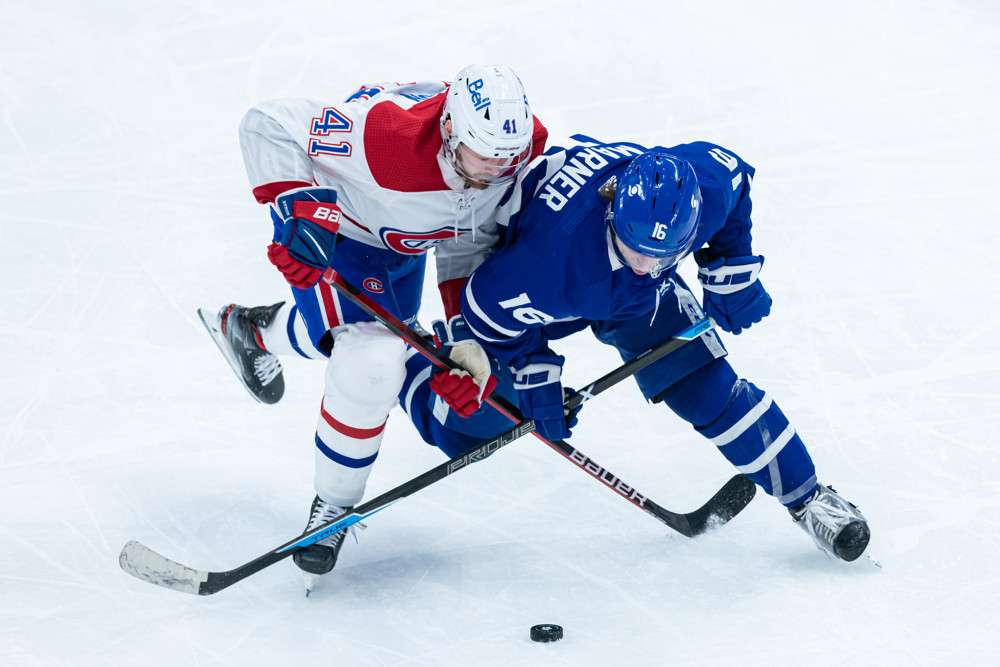Mitch Marner Lies at the Heart of Leafs’ Losing Culture
Over the past five years, the Toronto Maple Leafs have mastered the art of soul-crushing defeat. Despite lofty expectations, the team has failed to advance past the first round.
You could forgive their setbacks against the Washington Capitals and Boston Bruins, as Toronto was still an ascending young underdog at the time. But in the past two campaigns, the Leafs have been favored to beat the Columbus Blue Jackets and Montreal Canadiens—the latter by a large margin—only to flounder on the biggest stage once more.
There’s a pesky mental hurdle they can’t shake. It’s in their culture. It’s in their DNA. They just find ways to disappoint.
Toronto’s 3-1 loss to Montreal on Monday night was merely the latest in a long line of embarrassing Game 7 meltdowns for this franchise. And it was perhaps the most painful. This is a historic rivalry and the Leafs had armed themselves with veteran experience and defensive acumen to navigate the treacherous postseason waters. Furthermore, they held a 3-1 series advantage after four games.
As sad as it sounds, you could see this collapse coming a mile away. When Nick Suzuki saved Montreal’s season by converting on an overtime 2-on-0 rush in Game 5, it felt like the series was over:
Yes, the Leafs still held a 3-2 series lead. However, the moment Montreal announced that it wouldn’t gently fade into the night, it was over. When there’s any semblance of adversity or pushback, Toronto folds.
Unfortunately, home-grown star forward Mitch Marner should shoulder most of the blame.
With the Habs committing multiple defenders to stop Auston Matthews, Marner and linemate Zach Hyman were granted more time and space than they’ve enjoyed since arriving in the NHL. If there was ever a time for Marner to justify his $10.9 million cap hit, exorcise his playoff demons and simply dominate the proceedings, it’s when the opposition is rolling out the red carpet for you because it’s more concerned with your Rocket Richard Trophy-winning partner in crime.
But he fell agonizingly short. Again. Throughout the seven-game series, Marner couldn’t execute simple passes or even register shots when he was granted premium opportunities. In Game 7, he seemed rattled by the increased physicality and intensity on display:
Size—or a lack thereof—is no excuse either. Patrick Kane, Brad Marchand and more recently Brayden Point have delivered the goods in big-game scenarios by using their hockey sense, shiftiness and determination. Marner, meanwhile, checks out when the going gets tough. He bails on plays, bobbles pucks and gets pushed around like a kid on the playground. That is not who you want in your team’s foxhole.
Moreover, teams would never consider defending Chicago, Boston or Tampa Bay the way Montreal defended Toronto because Kane, Marchand and Point are capable shooters who would actually thrive rather than implode with extra space on the ice. Marner, for his part, has now failed to score in 18 consecutive playoff contests.
Even with these shortcomings, Marner insists on playing the hero. He’ll forgo the smart and efficient decision for the needlessly flashy one over and over again. His junior-style maneuvers may work in the regular season when clubs are more interested in fine-tuning their own game than shutting down their opponents, but it’s a whole other story in the playoffs. Holding on to the puck and generating chances becomes much more difficult.
Montreal’s 1-0 goal in Game 7 was a fitting example of Marner’s refusal to take what the defense gives him:
Sure, Jack Campbell needs to stop that shot. But why even offer the Habs that transition opportunity? With several bodies along the offensive blue line, you simply cannot give that puck up cheaply. Dish it to Morgan Rielly on the left side. Chip it in and let Hyman or Matthews go to work in the trenches. Anything but a turnover in that spot.
His performance on Monday night was plagued with such hiccups. He couldn’t get shots through traffic or find open teammates. Oftentimes, he couldn’t even get the puck past the first wave of defenders. Plays died on his stick every shift:
How is the top line expected to contribute when its primary puck-carrier is throwing away possessions for free?
Head coach Sheldon Keefe also needs to take some responsibility for his stubborn player deployment. It was clear early on that Marner was hurting the first line, but he kept going back to the well long after it had run dry. Marner’s lack of killer instinct reached the point where he was skating the puck into the slot…and then carrying it behind the net:
His play couldn’t sit any further away from winning hockey. He never does what it takes to prevail.
Down 2-0 with an extra attacker out on Monday night, the season boils down to a one-on-one board battle between Marner and Phillip Danault. Even if Marner doesn’t win this puck, the only unacceptable scenario is losing possession outright. Any guesses as to how this pans out?
If he showed some guts, put forth an honest effort and still couldn’t quite come out on top, that would be palatable. But while Matthews and Hyman fight for every inch in the trenches, he takes shortcuts all over the ice. He constantly cheats for turnovers. He attempts blind passes to no one in particular. He appears to care more about style points than wins. And with Montreal tendering him so much room to operate given its laser focus on Matthews, Marner’s warts were magnified to an extreme degree in this series.
Mitch Marner says he didn’t live up to his own standard: “I just have to make sure that it stops happening.”
— Chris Johnston (@reporterchris) June 1, 2021
He isn’t learning or evolving. He plays one way and is all out of ideas.
Here’s an uncomfortable one: Maybe Toronto can’t win with him in a leading role.
Recent Posts

How Corey Perry Is Making His Presence Felt With the Lightning
View Post »
How Adam Fox Pushed the Rangers Past the Penguins
View Post »

